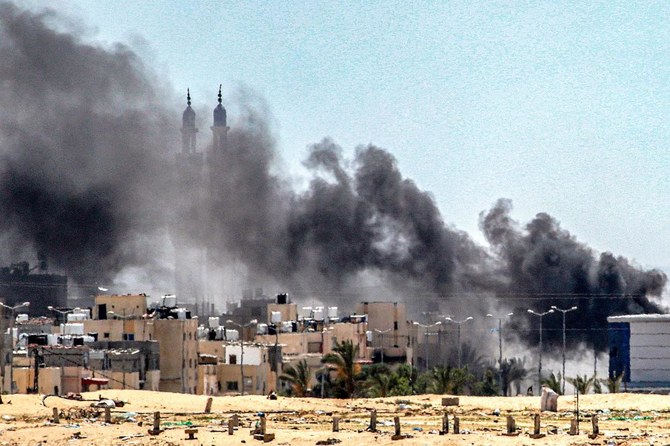CAIRO: Israeli airstrikes on Tuesday killed at least 17 Palestinians in two of the Gaza Strip’s historic refugee camps and Israeli tanks pushed deeper into the enclave’s southern city of Rafah, residents and medics said.
Residents reported heavy bombardments from tanks and planes in several areas of Rafah, where more than a million people had taken refuge before May. Most of the population has fled northwards since then as Israeli forces invaded the city.
“Rafah is being bombed without any intervention from the world, the occupation (Israel) is acting freely here,” a Rafah resident and father of six told Reuters via a chat app.
Israeli tanks were operating inside Tel Al-Sultan, Al-Izba, and Zurub areas in Rafah’s west, as well as Shaboura at the heart of the city. They also continued to occupy the eastern neighborhoods and outskirts as well as the border with Egypt and the vital Rafah border crossing.
“There are Israeli forces in most areas, there is heavy resistance too and they are making them pay dearly but the occupation is not ethical and they are destroying the city and the refugee camp,” the resident said.
Palestinian health officials said one man was killed in the morning by Israeli fire on the eastern side of Rafah. Medics said they believed many others had been killed in the past days and weeks but rescue teams could not reach them.
The Israeli military said it was continuing “precise, intelligence-based activity” in Rafah, killing many Palestinian gunmen over the past day in close-range combat and seized weapons. The air force struck dozens of targets across the Gaza Strip in the past day, it added.
In the central Gaza Strip, two separate Israeli air strikes on two houses killed 17 Palestinians in Al-Nuseirat and Al-Bureij, two designated refugee camps that are home to families and descendants of people who fled to Gaza in the 1948 war around the creation of Israel, medics said.
“Every more hour of delay, Israel kills more people, we want a ceasefire now,” said Khalil, 45, a teacher from Gaza, now displaced with his family in Deir Al-Balah city in the central Gaza Strip.
“Enough of our blood, I say it to Israel, America, and our leaders too. The war must stop,” he told Reuters via a chat app.
The Israeli military statement did not comment directly on the 17 deaths but said forces continued to operate against militant factions in central Gaza areas.
The commander of an Islamic Jihad sniper cell was killed by an Israeli warplane, and troops also “eliminated” a militant cell, it said.
The armed wings of Hamas and Islamic Jihad said fighters confronted Israeli forces in combat zones with anti-tank rockets and mortar bombs, and have in some areas detonated pre-planted explosive devices against army units.
Israel’s ground and air campaign was triggered when Hamas-led militants stormed into southern Israel on Oct. 7, killing around 1,200 people and seizing more than 250 hostages, according to Israeli tallies.
The offensive has left Gaza in ruins, killing more than 37,400 people, according to its health authorities, and left much of the population homeless and destitute.
Since a week-long truce in November, repeated attempts to arrange a ceasefire have failed, with Hamas insisting on a permanent end to the war and full Israeli withdrawal from Gaza. Netanyahu refuses to end the war before Hamas is eradicated and the hostages are freed.



























